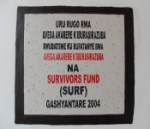
Survivors Fund (SURF) is featured in an article in the Guardian on “Why small charities need to work to break through the £1m barrier”. Anne Nicholls writes:
The story of the Survivors Fund shows the importance of securing sustainable funding and developing a strong profile. The charity was set up in 1997 to support women survivors of the genocide in Rwanda, many of whom had been raped.
Their income in 2009 was £530,000 and is set to hit £1m this year, doubling in just two years. David Russell, the chief executive – and only full-time employee in the UK – has adopted a successful strategy focused largely on securing funding from three sources – the Department for International Development (DfID), Comic Relief and the Lottery.
As the only charity providing support for the women survivors of the genocide, the Survivors Fund was able to mobilise £4m funds from DfID – an exceptional achievement. A high-profile event in Trafalgar Square in 2004 to mark the 10th anniversary of the genocide helped to raise the charity’s profile – an important prerequisite to successful fundraising. But Russell has also developed valuable alliances with a foundation [Foundation Rwanda] in the USA, also working in Rwanda, set up by a photojournalist from Newsweek magazine.
“Although it is relatively easy to raise money through events, the key to scaling up and getting the first multi-year grant is visibility, a good track record with audited accounts and a solid base. But it means a lot of hard work,” says Russell.
